IELTS Reading Tips (Easiest Strategy)
Most IELTS Reading tips are complicated and difficult to follow.
In just one lesson, you’ll learn everything you need to easily get the highest possible score.
You’ll do this without remembering lots of information, skimming, scanning or any of those complex techniques.
Also, this lesson applies to IELTS General Reading and IELTS Academic Reading as the question types are the same even though the text types are not.

Contents
Prefer to watch the video version?
IELTS Reading Tips to Find Answers
Unlike most IELTS Reading tips, I’m not going to recommend that you read the questions first.
This is because each passage has roughly 13 questions and, most candidates forget the first question by the time they read the last one.
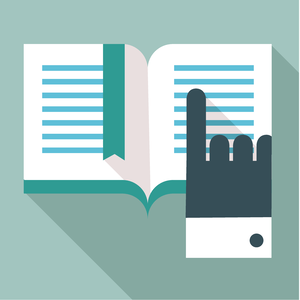
Instead, this is what to do in your IELTS Reading test;
- Read the Title (if there is one)
- Read the First Paragraph
- Answer Any Questions You Can
- Repeat with the Next Paragraph
IELTS Reading Tips to Find Answers #1
Read the Title
In the reading test, there are 3 passages, and we will start with Passage 1, as it’s the easiest.
If the passage has a title, read it; if not, move to the next step.

IELTS Reading Tips to Find Answers #2
Read the First Paragraph
Read all of the first paragraph from start to finish.
Here are some specific IELTS Reading tips related to this.
Don’t Read Too Fast
You need to read as fast as you can, but not faster than you can.
If you read too quickly, you’ll finish the paragraph without understanding what you’ve read.
Reread When Necessary
You’ll inevitably get distracted from time to time.
When this happens, your eyes continue across the words on the page, but your brain doesn’t process any of the information.
Once you realise, go back to the part of the paragraph where you got distracted and reread it.

Don’t Read with Your Lips
A lot of people move their lips into the shapes of the words they’re reading.
This is a bad idea because it slows your reading down to the speed at which you speak.
If you have this habit, you need to stop.
Follow Your Finger
When you move a pen or a finger under the words as you read, it’s easier for your eyes to stay focused.
That means that you can increase your reading speed by doing this.
If you’re doing the computer-based IELTS test, using the cursor in a similar way has the same effect.
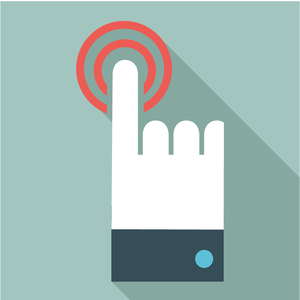
IELTS Reading Tips to Find Answers #3
Answer Any Questions You Can
After you’ve finished reading the paragraph, go through all the questions for this passage and answer whichever ones you can.
This means that you’ll read the questions every time you finish a paragraph.
As you read the questions, you may need to reread some sentences in the paragraph to check specific details.
Answers You’re Confident Of
As you go through the questions, there will be some that you can answer with 100% certainty.
For these, write the answers in the appropriate spaces.

Answers You’re Not Confident Of
There will be some answers that you think you’ve found, but you’re not entirely sure if you’re correct.
For these, note the answer on the question sheet or notepaper with a slash (/) next to it.
The slash (/) will remind you to continue checking this question after reading each of the subsequent paragraphs.
You Don’t Have to Read Every Question
Because we’re checking the questions after finishing each paragraph, we need a way to do this as quickly as possible.
Obviously, the ones you’ve already answered with 100% certainly don’t need to be read again.
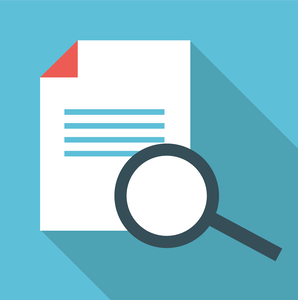
However, for some question types, the answers are found in the same order as the questions.
That means the answer to the first question is nearest the top of the passage, the answer to the second question is below the first answer, the answer to the third question is below the second answer and so on.
Here is an example of one of these question types.
True/False/Not Given Questions
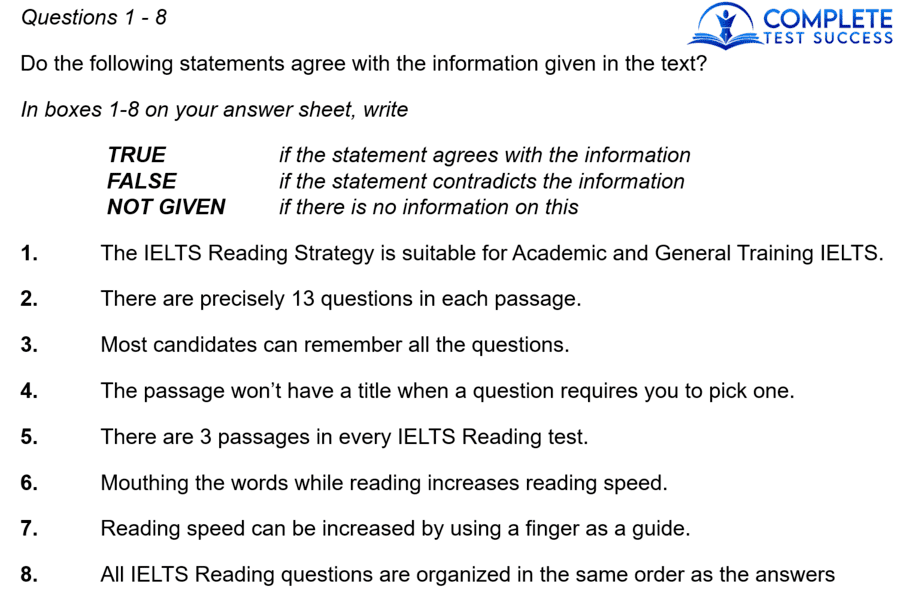
Because we know that answers for this question type are in order, we don’t need to read all eight questions after finishing the first paragraph.
Instead, we read question 1, to see if we can answer it.
Then we read question 2 because if we can answer this one, we know that we’ve missed the answer to question 1 and need to look at the text again.
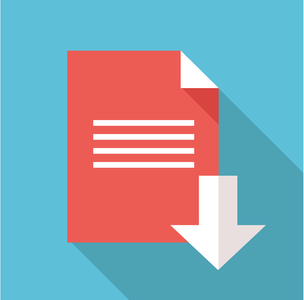
As you find the answers, move down through the questions in this question type and always read the top two that you haven’t answered yet.
Below, you’ll find all the other question types for which answers appear in the same order as the questions.
Yes/No/Not Given Questions
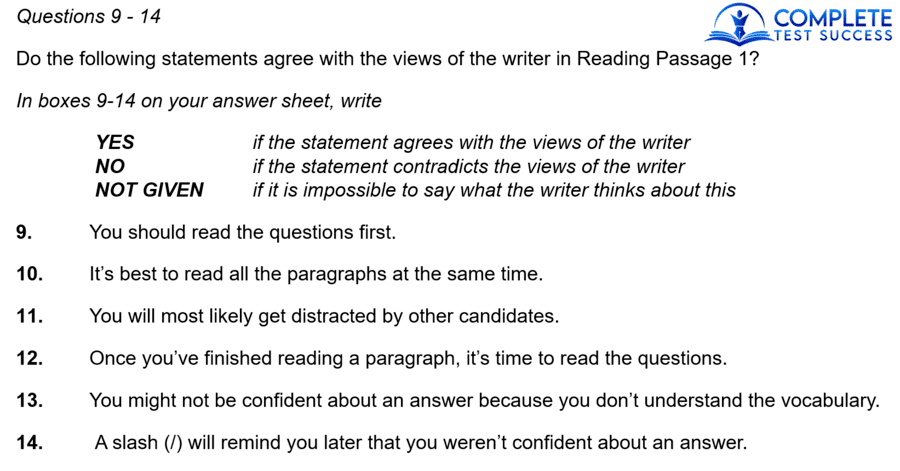
Sentence Completion Questions
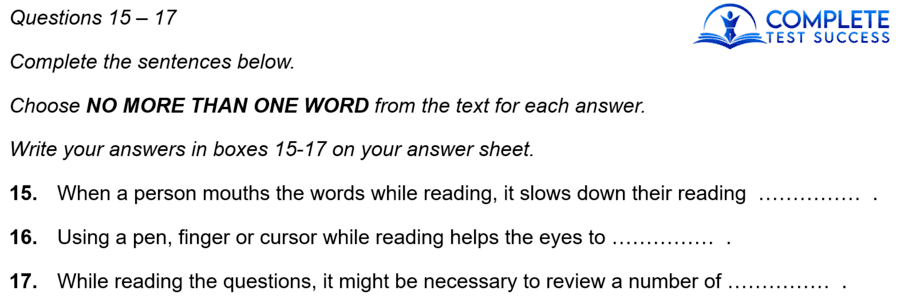
Multiple-Choice Questions
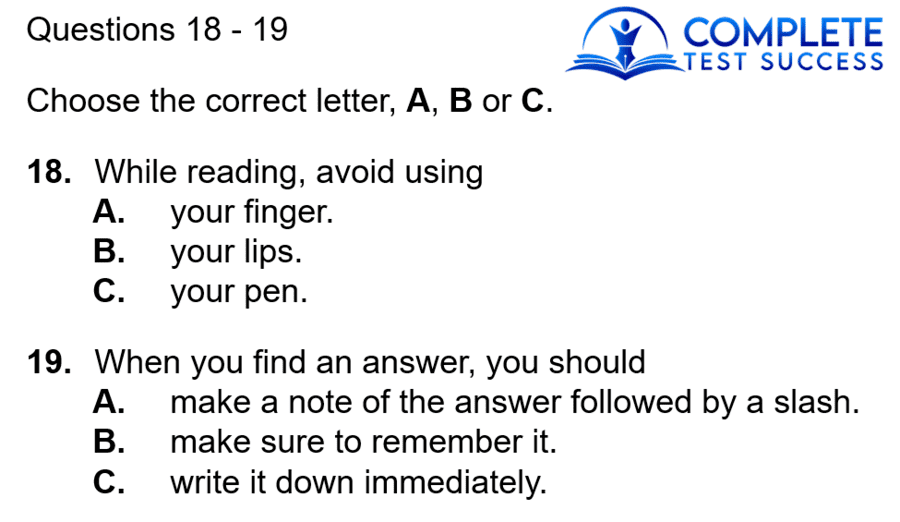
Matching Sentence Endings Questions
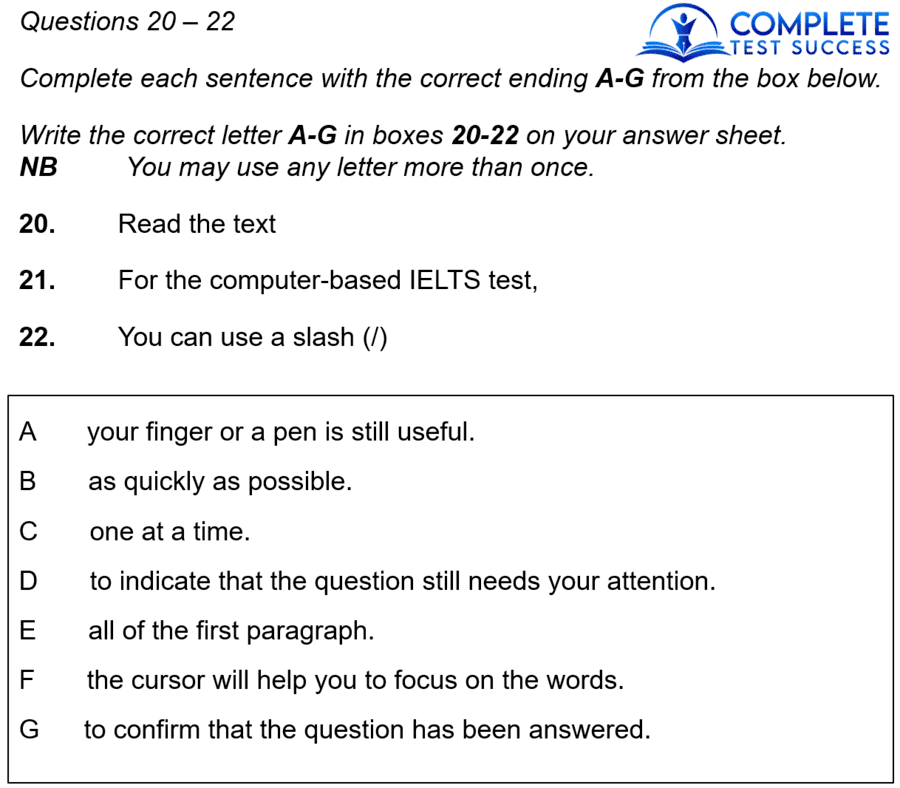
Short Answer Questions
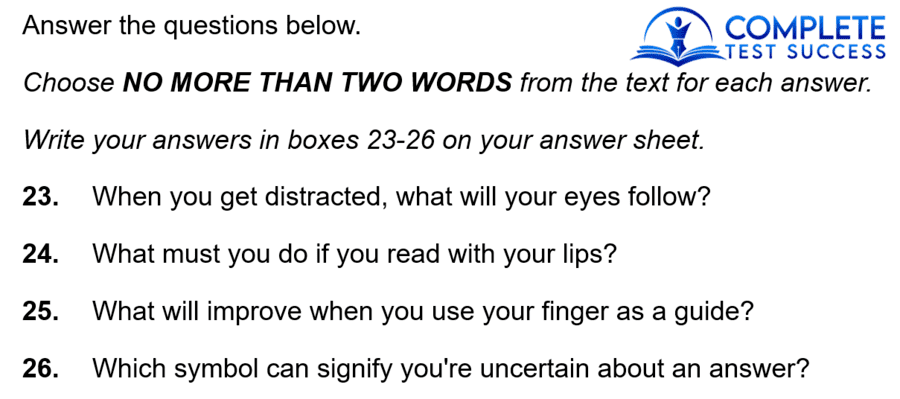
Tips to Find Answers #4
Repeat with the Next Paragraph
Once you’ve gone through all the questions for the paragraph, read the next paragraph and repeat the process.
Once you’ve finished all the paragraphs, move on to the following passage.

IELTS Reading Tips to Improve Scores
Now that you know how to do a reading test, let’s look at how to improve your IELTS Reading band score.
- Use Reliable IELTS Reading Practice Tests
- Do One IELTS Reading Practice Test
- Analyse Every Incorrect Answer
- Do Another IELTS Reading Practice Test
IELTS Reading Tips to Improve Scores #1
Use Reliable IELTS Reading Practice Tests
It’s essential that you use the IELTS Reading practice tests that Cambridge produced.
This is because unofficial materials are often produced by people who don’t fully understand the IELTS Reading test format.
Here, you can see the scores of a student I helped to get a band 7 in IELTS Writing.
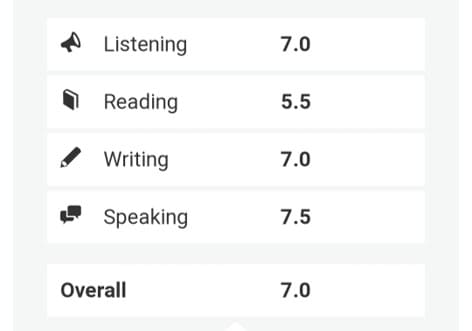
However, we didn’t discover until after the test that she had been using unofficial materials, and it’s clear the effect this had on her IELTS Reading band score.
The books you need are the Cambridge IELTS books which look like the ones in this image.
These are available in all good book shops, and I would advise that you purchase at least two editions of these books.
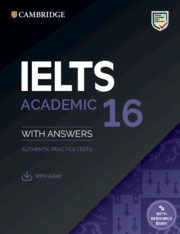
However, don’t purchase books 1 to 4 as those are the old format of the IELTS Reading test.
Cambridge IELTS books 5 to 10 contain for IELTS Academic Reading tests and one IELTS General Reading test.
Because of that, those editions are not the best value for money if you’re doing the IELTS General Reading test.
From book 11 onwards, there is one version for Academic IELTS and one for General Training IELTS so make sure to buy the appropriate one.
IELTS Reading Tips to Improve Scores #2
Do One IELTS Reading Practice Test
You need to complete the real IELTS Reading test in 60 minutes, but you should not limit yourself to just one hour when you first start preparing.
In the beginning, take as long as you need to become familiar with the format of the test, the types of questions and the various instructions.
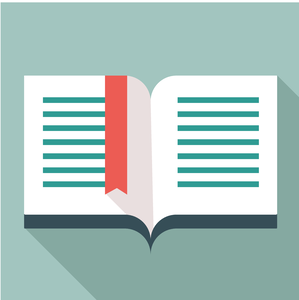
After each IELTS Reading practice test, use this table to convert the number of correct answers you get into an IELTS Reading band score.

Once you start getting the scores you need in your practice tests, you can start practising within the time limit.
IELTS Reading Tips to Improve Scores #3
Analyse Every Incorrect Answer
You should not do another IELTS Reading practice test until you’ve completely analysed every incorrect answer you chose.
It’s best to analyse an IELTS Reading practice test immediately after completing one because you’ll remember more about what you did and what you were thinking.
By discovering the exact mistakes you made for every wrong answer, you will learn what you need to do to increase your score.

The mistakes you discover will fall into one of two categories;
Exam Skill Mistakes
Any mistakes you discover related to exam skills must be remembered so that you don’t repeat them in subsequent IELTS Reading practice tests.
Here are examples of these types of mistakes;
Not following the instructions.
This happens when you either didn’t read the instructions carefully enough or you forgot what they were.
For example, writing a two-word answer when the instruction says, “Choose NO MORE THAN ONE WORD from the text for each answer.“
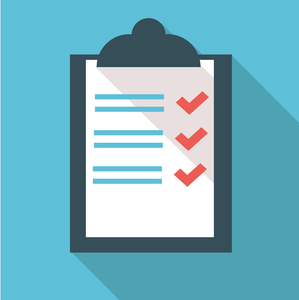
Or perhaps you wrote “True” when the instructions indicated that you must write “Yes“.
Not Checking Grammatical Accuracy
The answers to some questions are determined by their grammar.
If you don’t check the grammar of each question carefully enough, it can result in selecting the wrong answer.
Spelling
If you misspell a word on the answer sheet, the answer will be marked as incorrect.
This is why you must check the spellings in the passages for any words you’re unsure how to spell.
Language Ability Mistakes
These mistakes happen when you don’t fully understand a question or parts of the text.
If you don’t get the score you need because of these types of mistakes, the only solution is to improve your English ability.

Doing more IELTS Reading practice tests without improving first is a waste of time and a waste of a practice test.
To do this, you can follow my Vocabulary Improvement and Grammar Improvement Strategies.
Some students learn new vocabulary from reading passages, but I advise against this as you’re unlikely to see those words in other reading tests.
Also, once you get the score you need and practice under exam conditions, you might discover that you can’t read quickly enough.
To resolve this, the only solution is to read in English regularly.
Tips to Improve Scores #4
Do Another IELTS Reading Practice Test
Once you’ve discovered all your mistakes and taken the necessary action to improve your scores, it’s time to do another IELTS Reading practice test.
When you can complete a practice test in one hour and get the score you need two or three times in a row, you’re ready for the real IELTS Reading test.

What now?
Right now, you need to get some Cambridge IELTS books and follow IELTS Reading tips from above.
You can use these IELTS Reading practice tests while you’re waiting to get the books.
- Sample Test #1
- Sample Test #2
- Sample Test #3
- Sample Test #4
- Sample Test #5
- Sample Test #6
- Sample Test #7
- Sample Test #8
- Sample Test #9
- Sample Test #10
- Sample Test #11
- Sample Test #12
- Sample Test #13
- Sample Test #14
- Sample Test #15
Also, some students doing the paper-based IELTS test like practising with printed copies of the answer sheet, and you can find it here if you’re interested.
You can also complete my lessons for the other parts of the IELTS test;
Finally, make sure to sign up for my free Live Feedback Lessons every week, once the IELTS Reading tips have helped you achieve your IELTS Reading band score.
